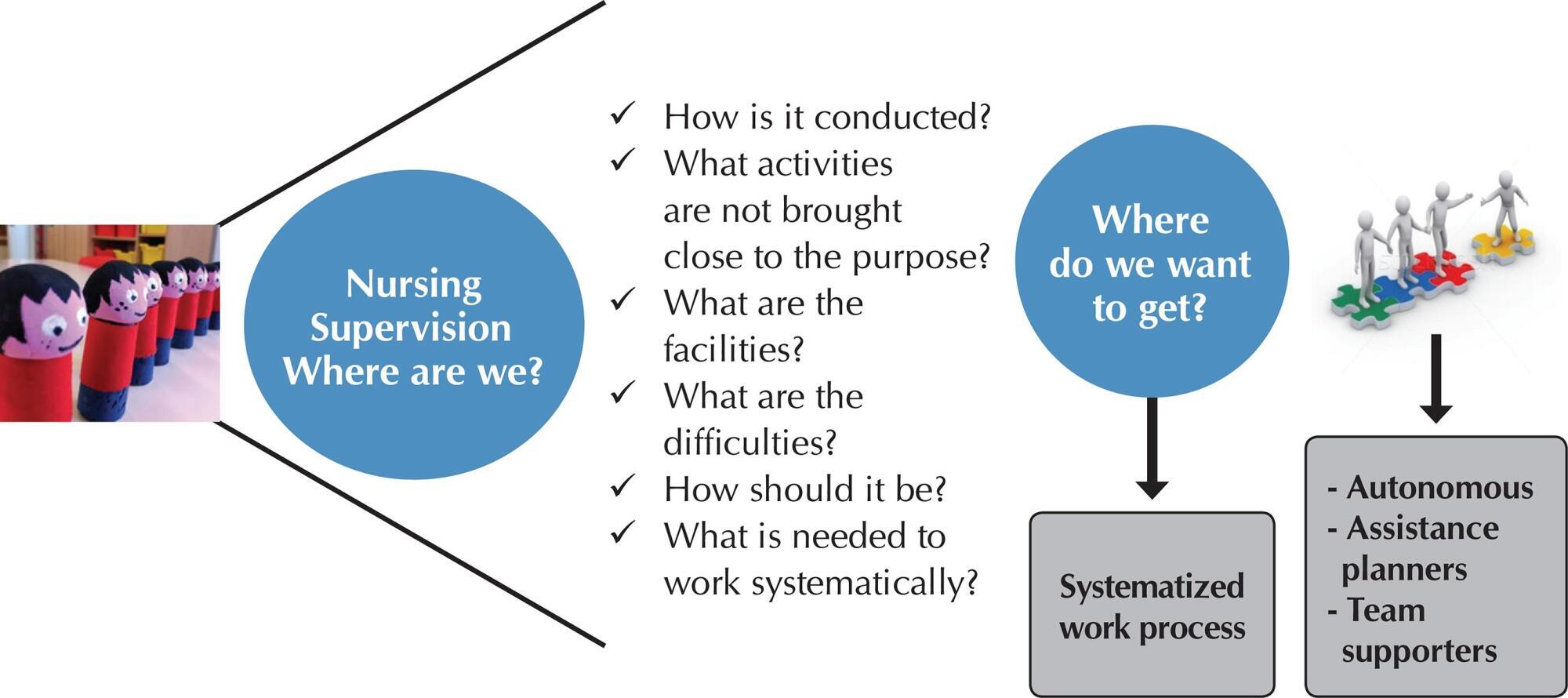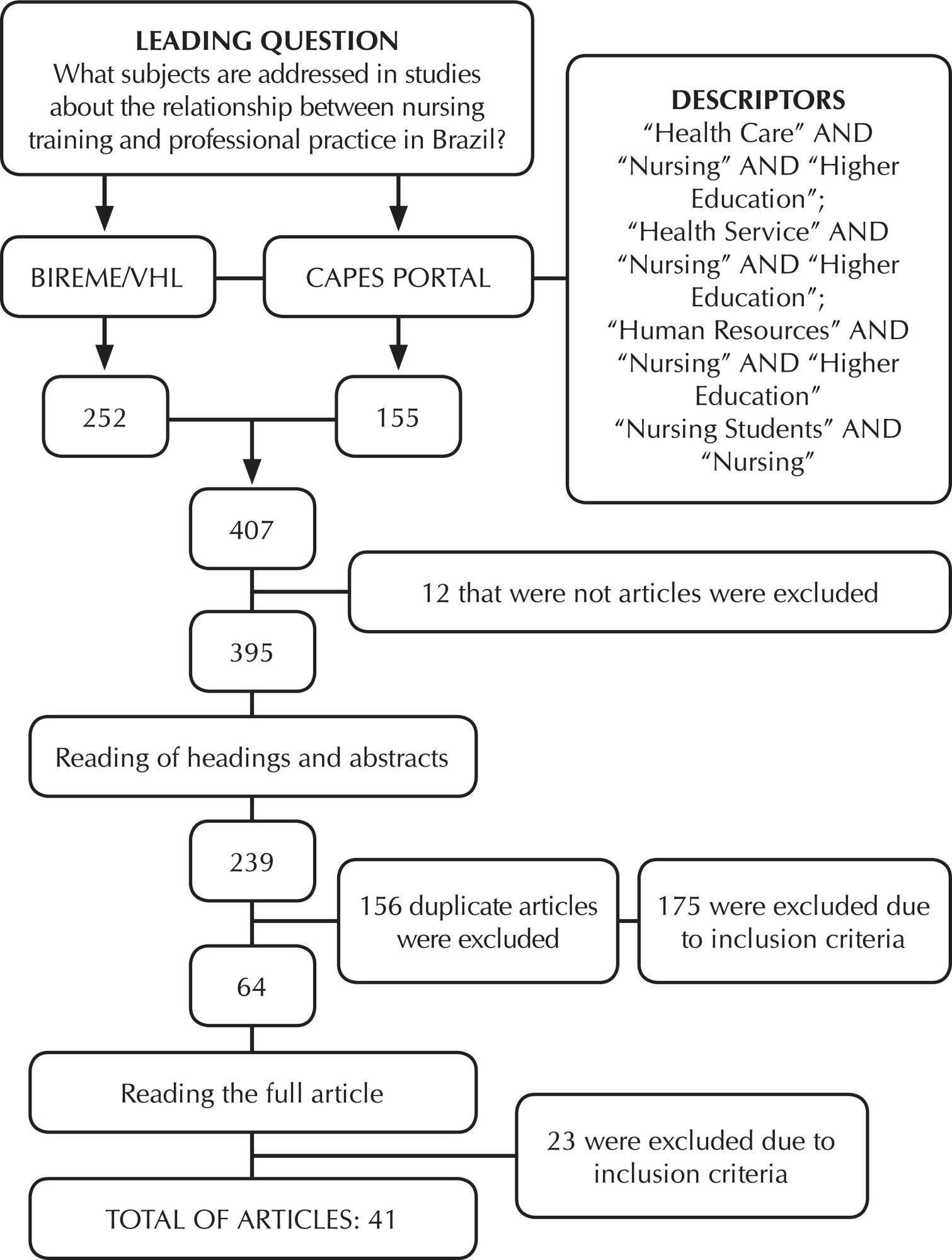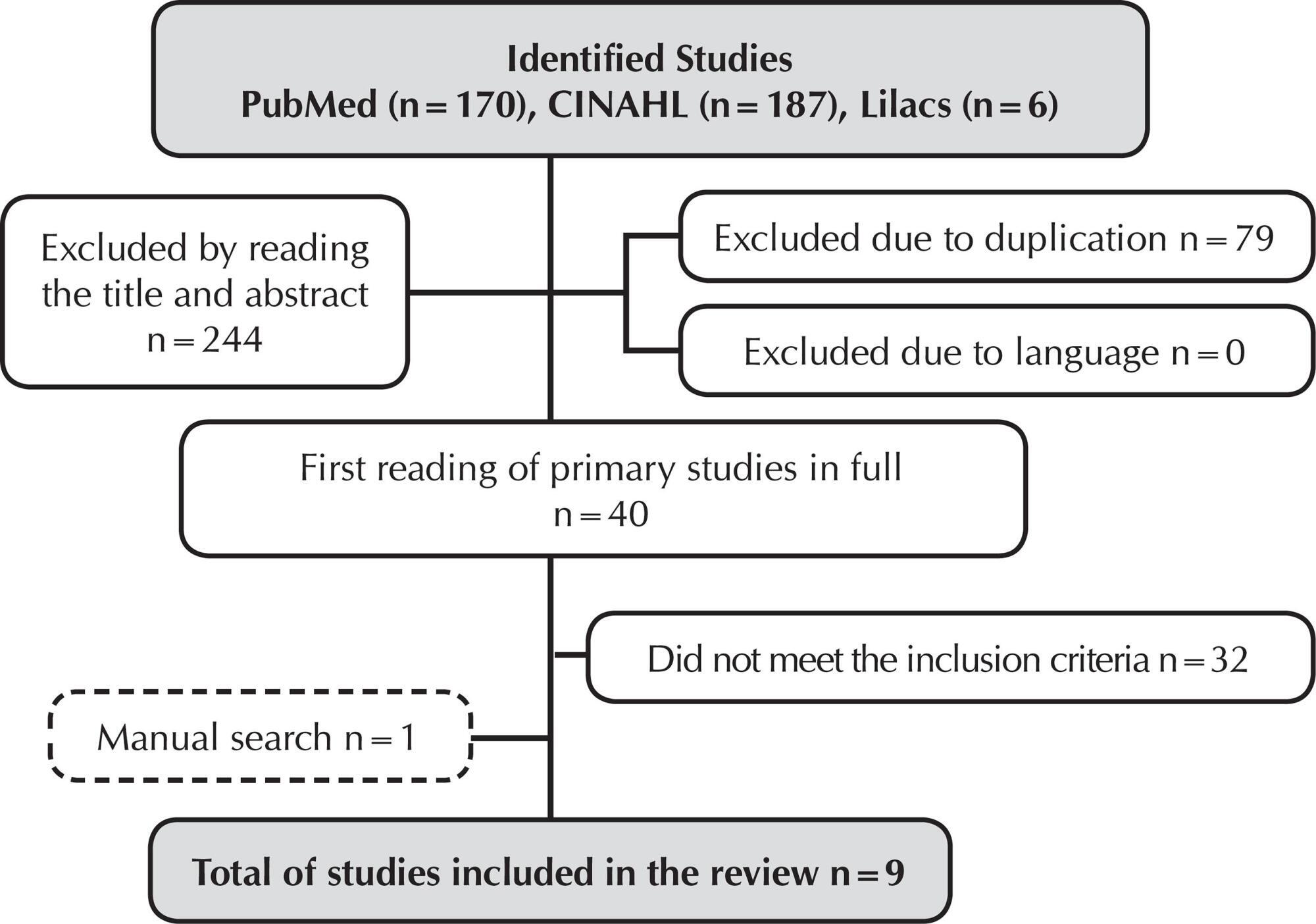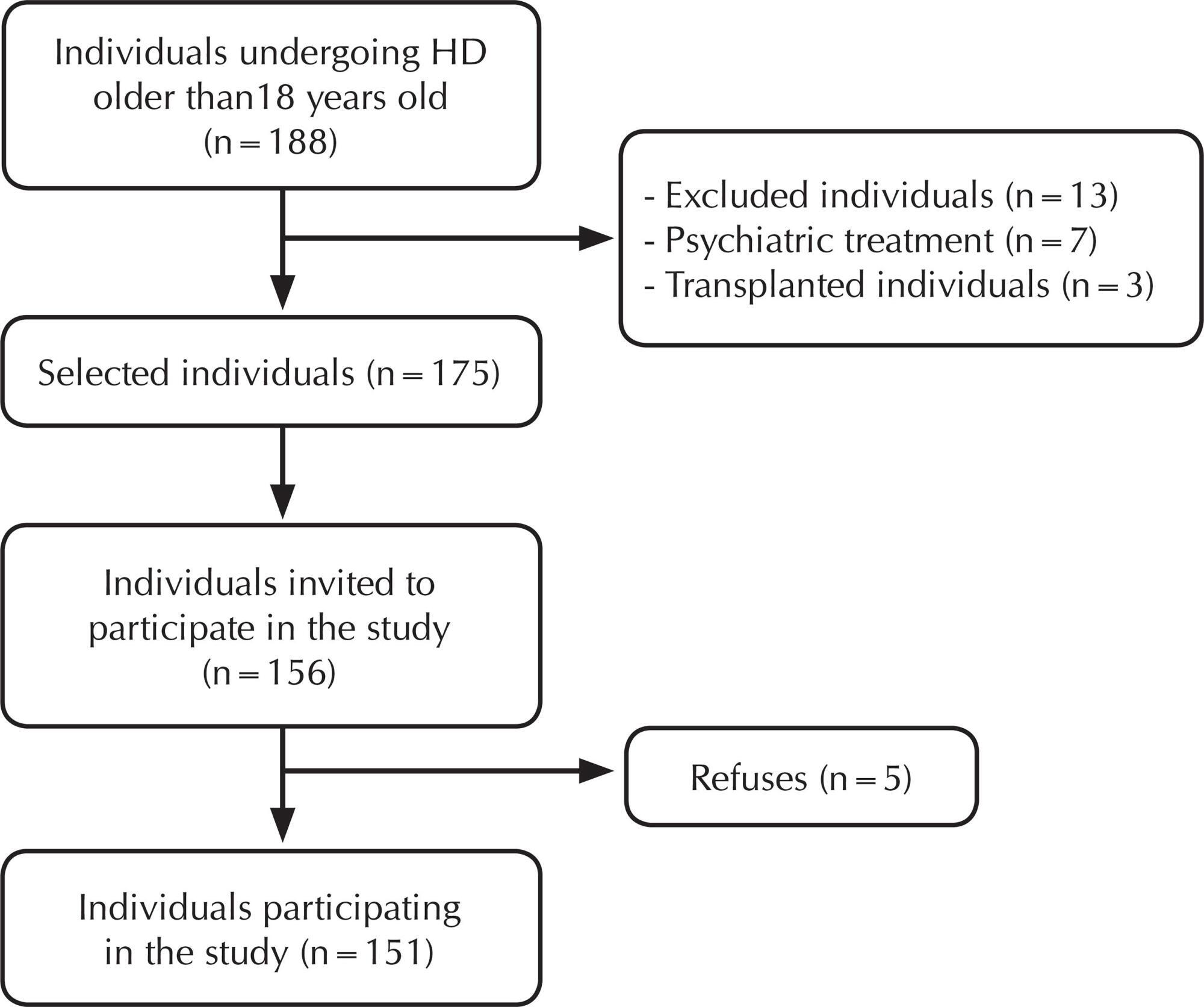-
REFLECTION01-01-2018
Advanced practices for care management: reflections on the Brazilian Nursing
Revista Brasileira de Enfermagem. 2018;71(4):2060-2065
Abstract
REFLECTIONAdvanced practices for care management: reflections on the Brazilian Nursing
Revista Brasileira de Enfermagem. 2018;71(4):2060-2065
DOI 10.1590/0034-7167-2017-0115
Views0ABSTRACT
Objective:
to explain about the Advanced Nursing Practice and to discuss the possibilities of the Advanced Practice for the management of nursing care in Brazil.
Method:
this is a theoretical-reflexive trial, based on the international literature on advanced practices in nursing and analysis relevant to the profession and to the Brazilian context.
Results:
the object of the study was described in the following driving axes: Advanced Practice Nurse: international examples and Brazilian reality; Reflections on the care management by the Advanced Practice Nurse in Brazil. Autonomy, qualified training, leadership and performance based on scientific evidences as the foundation of the best care management by the Advanced Nursing Practice, stand out.
Final considerations:
while early and challenging, the work of Brazilian nursing towards advanced professional practice seems to be interesting, since the possibilities of managing the care of this modality of nurses’ performance are evident.
Keywords:Advanced Nursing PracticeHealth ManagementManagementManagement of Professional PracticeNurse Women and Nurse MenSee more -
REFLECTION01-01-2018
The Sociology of Pierre Bourdieu: theoretical potential for the subfield of nursing
Revista Brasileira de Enfermagem. 2018;71(4):2055-2059
Abstract
REFLECTIONThe Sociology of Pierre Bourdieu: theoretical potential for the subfield of nursing
Revista Brasileira de Enfermagem. 2018;71(4):2055-2059
DOI 10.1590/0034-7167-2016-0505
Views0See moreABSTRACT
Objective:
to approach the basic conceptions of Pierre Bourdieu’s sociology and its articulation with the subfield of nursing by focusing on managerial aspects.
Method:
reflections are based on the concepts of field, habitus, capital and symbolic power applied to the subfield of nursing by favoring the understanding of organizational dynamics and its agents.
Result:
health institutions are living structures in the adverse social world where nursing agents’ interests express their way of thinking and acting according to the place they occupy in the organization. These spaces of fight and symbolic violence tend to inculcate ideologies that meet these agents’ interests.
Final Considerations:
The proposition theory is fruitful to reflect the practice of management by unveiling the relationships and role that organizations establish about their agents. She warns about the possibility of seeing changes in the subfield of nursing.
-
EXPERIENCE REPORT01-01-2018
Workshops as a democratic proposal in order to change the supervision work in nursing
Revista Brasileira de Enfermagem. 2018;71(4):2050-2054
Abstract
EXPERIENCE REPORTWorkshops as a democratic proposal in order to change the supervision work in nursing
Revista Brasileira de Enfermagem. 2018;71(4):2050-2054
DOI 10.1590/0034-7167-2017-0286
Views0ABSTRACT
Objective:
to report the experience of developing workshops as an intervention strategy in an action research, aiming to review the work of supervision in hospital nursing.
Method:
to report of the experience of planning, developing and evaluating workshops with a psychosocial approach. Three workshops were held, in a reserved place, with the participation of 21 supervisors of a public university hospital. Each workshop was organized with heating, day work, closure with syntheses and consensus.
Results:
the work provided the exchange of experiences, reflections and proposals for difficulties identified in the work process that distract supervisors from the management of assistance such as communication failure, reworking and lack of definition of assignments in the team.
Conclusion:
the dynamics of the workshops favored supervisors to propose solutions to the difficulties of their practice in a more democratic and participative way, through dialogical interactions, sharing of the feelings pertinent to the work context and establishing consensus for the completion of the task.
Keywords:EducationHospital AdministrationHospital Nursing ServiceNursing SupervisionOrganization and AdministrationSee more
-
REVIEW01-01-2018
Nursing training and professional practice: an integrative review of literature
Revista Brasileira de Enfermagem. 2018;71(4):2039-2049
Abstract
REVIEWNursing training and professional practice: an integrative review of literature
Revista Brasileira de Enfermagem. 2018;71(4):2039-2049
DOI 10.1590/0034-7167-2016-0504
Views0See moreABSTRACT
Objective:
to identify themes addressed in studies on the repercussions of nursing training in professional practice in Brazil.
Method:
this is a qualitative research, following the assumptions of Ganong’s Integrative Literature Review (1987). The keywords or terms “Health Care” were used; “Nursing”; “Higher Education”; “Teaching in Higher Education”; “Health Service”; “Human Resources” and “Nursing Undergraduates” in consultation with the Virtual Health Library and the CAPES Portal of Journals. Sixty-four studies were found, of which 41 met the inclusion criteria.
Results:
in the analysis, three themes were highlighted: pedagogical processes and the role of professors and students; curricular structure in nursing education; management of health training.
Final considerations:
we observed the need to incorporate the Brazilian Unified Health System (SUS) principles and directives in nursing education in the country so that the training is consistent with the needs of professional practice. The study points out to the challenges that emerge with this incorporation.

-
REVIEW01-01-2018
Competences and Barriers for the Evidence-Based Practice in Nursing: an integrative review
Revista Brasileira de Enfermagem. 2018;71(4):2030-2038
Abstract
REVIEWCompetences and Barriers for the Evidence-Based Practice in Nursing: an integrative review
Revista Brasileira de Enfermagem. 2018;71(4):2030-2038
DOI 10.1590/0034-7167-2016-0617
Views0ABSTRACT
Objective:
To analyze knowledge, attitudes, practices, and frequent barriers to the implementation of the Evidence-Based Practice among nursing assistants in the hospital.
Method:
This is an integrative review, whose search for primary studies occurred in the PubMed, CINAHL and LILACS databases. For the analysis, cross-sectional observational studies were included in English, Portuguese and Spanish, published in nursing journals, from January 2007 to July 2016.
Results:
The search resulted in 363 articles, including nine primary studies. The sources of recurrent evidence among care nurses were: personal experience and local care protocols. These professionals presented weaknesses in the implementation of the Evidence-Based Practice related to the lack of knowledge for evidence evaluation, work overload and resistance to change of practice.
Final considerations
Nurses presented favorable attitudes, however, with little knowledge to perform the Evidence-Based Practice. Results can support interventions for its implementation in the hospital.
Keywords:Clinical NursesEvidence-Based Clinical PracticesEvidence-based NursingHospitalsResearch in NursingSee more
-
REVIEW01-01-2018
Impact of venous ulcers on patients’ quality of life: an integrative review
Revista Brasileira de Enfermagem. 2018;71(4):2021-2029
Abstract
REVIEWImpact of venous ulcers on patients’ quality of life: an integrative review
Revista Brasileira de Enfermagem. 2018;71(4):2021-2029
DOI 10.1590/0034-7167-2017-0516
Views0See moreABSTRACT
Objective:
To analyze knowledge gathered about the impact of venous ulcers on patients’ quality of life.
Method:
Systematic bibliographic review study with an integrative approach. Databases of MEDLINE, LILACS, IBECS, CINAHL Complete, Web of Science, Scopus, and CUIDEN Plus were used for selection with the PICOT guiding criteria, through the DeCS and MeSH: adult, aged, varicose ulcer, and quality of life, in Portuguese, Spanish, and English. The inclusion criteria were: full original articles available in the databases selected with adherence to the theme in Portuguese, Spanish, and English, published from 2007 to 2016.
Results:
The sample included 14 national and international articles with different methodological approaches and investigative contexts, published from 2012 to 2016.
Conclusion:
Chronic venous ulcers act on patients’ bio-psycho-social-spiritual and socioeconomic spheres, having a negative impact on their quality of life.

-
Nursing diagnoses of patients with kidney disease undergoing hemodialysis: a cross-sectional study
Revista Brasileira de Enfermagem. 2018;71(4):2014-2020
Abstract
Nursing diagnoses of patients with kidney disease undergoing hemodialysis: a cross-sectional study
Revista Brasileira de Enfermagem. 2018;71(4):2014-2020
DOI 10.1590/0034-7167-2017-0225
Views0ABSTRACT
Objective:
to identify Nursing Diagnoses of 5th stage chronic kidney disease patients undergoing hemodialysis.
Method:
cross-sectional, descriptive and quantitative study carried out with 151 patients undergoing hemodialysis in a clinic specialized in nephrology from the Northwest of the Paraná State. Nursing Diagnoses were determined through Nanda-I in which had the percentage greater than 50%. The analysis used was the simple statistics.
Results:
17 Nursing Diagnoses were identified, emphasizing the risks present in 100% of patients: risks for electrolyte imbalance; ineffective kidney perfusion; infection: vascular injuries, adverse response to the iodine-based contrast-enhanced and impaired urinary elimination.
Conclusion:
the main diagnoses listed reflect the more frequent risks that patients undergoing hemodialysis are exposed to. Being aware of these risks allows the nursing planning with early interventions, in order to prevent complications related to the disease and to promote best life conditions.
Keywords:Chronic Kidney DiseaseKidney DialysisNursing DiagnosisNursing ProcessesRenal Replacement TherapySee more
-
The process of dying/death: intervening conditions to the nursing care management
Revista Brasileira de Enfermagem. 2018;71(4):2005-2013
Abstract
The process of dying/death: intervening conditions to the nursing care management
Revista Brasileira de Enfermagem. 2018;71(4):2005-2013
DOI 10.1590/0034-7167-2017-0173
Views0See moreABSTRACT
Objective:
To exhibit the factors that influence the Nursing care management in the face of death and the process of dying/death of hospitalized adults in the medical-surgical units for hospitalization.
Method:
The Grounded Theory was applied with the theorical support of the Complex Thinking Theory. Data have been collected through semi-structured interviews from May, 2015 to January, 2016 with three sample groups totaling 41 participants: nurses, assistant nurses and members of multidisciplinary group. Data analysis followed the steps of open coding, axial coding and selective coding.
Results:
The category “Pointing out the interfaces of care management to patients in process of death/dying and their families” and its respective subcategories show the complex interactions established by the nurse due to the Nursing care management.
Final considerations:
Subjective, educational, sociocultural and institutional conditions influence the nurse interactions, causing order/disorder on care management.
-
ERRATUM01-13-2024
ERRATUM
Revista Brasileira de Enfermagem. 2024;77(6):e2024n6e08
Abstract
ERRATUMERRATUM
Revista Brasileira de Enfermagem. 2024;77(6):e2024n6e08
DOI 10.1590/0034-7167.20247706e08
Views0In the article “Brazilian nursing specific situation, middle and micro-range theories: a bibliometric study”, with DOI number: , published in Revista Brasileira de Enfermagem, 2024;77(4):e20230520, Chart 1:Where it read:[…]See more -
ERRATUM01-13-2024
ERRATA
Revista Brasileira de Enfermagem. 2024;77(6):e2024n6e07
Abstract
ERRATUMERRATA
Revista Brasileira de Enfermagem. 2024;77(6):e2024n6e07
DOI 10.1590/0034-7167.20247706e06pt
Views0No artigo “Crenças e atitudes de pais ou responsáveis legais sobre a vacinação infantil: revisão de escopo”, com número DOI: , publicado no periódico Revista Brasileira de Enfermagem, 2024;77(4):e20240126, página 5:Onde se lia:[…]See more -
ORIGINAL ARTICLE01-13-2024
Indicators associated with severity and mortality in hospitalized people with HIV: A retrospective cohort
Revista Brasileira de Enfermagem. 2024;77(6):e20240204
Abstract
ORIGINAL ARTICLEIndicators associated with severity and mortality in hospitalized people with HIV: A retrospective cohort
Revista Brasileira de Enfermagem. 2024;77(6):e20240204
DOI 10.1590/0034-7167-2024-0204
Views0See moreABSTRACT
Objectives:
to compare the sociodemographic and clinical severity indicators of hospitalized people with HIV in relation to clinical outcomes and urgent hospital admission.
Methods:
a retrospective cohort study was conducted with 102 medical records of HIV-infected individuals hospitalized in a hospital in southern Brazil. In addition to descriptive analysis, Fisher’s exact test, Pearson’s Chi-square, and logistic regression were used.
Results:
the data showed a significant direct effect on severity indicators in the following variables: male sex (p=0.013), skin color (p=0.023), level of education (p=0.000), urgent admissions (p=0.000), late diagnosis (p=0.001), diabetes mellitus (p=0.001), hypertension (p=0.004), kidney disease (p=0.002), high viral load (p=0.006), CD4+ count below 200 (p=0.005), fever (p=0.016), weight loss (p=0.013), co-infection with hepatitis C (p=0.004), and mortality (p=0.007).
Conclusions:
three sociodemographic and thirteen clinical markers were identified as being associated with the risk of clinical deterioration in hospitalized people with HIV.

-
ORIGINAL ARTICLE01-13-2024
Nurses’ perspectives on the use of telemonitoring in the management of people with diabetes and hypertension
Revista Brasileira de Enfermagem. 2024;77(6):e20230481
Abstract
ORIGINAL ARTICLENurses’ perspectives on the use of telemonitoring in the management of people with diabetes and hypertension
Revista Brasileira de Enfermagem. 2024;77(6):e20230481
DOI 10.1590/0034-7167-2023-0481
Views1See moreABSTRACT
Objectives:
to understand the perspective of nurses on the use of telemonitoring in the management of people with type 2 diabetes mellitus and arterial hypertension in primary care.
Methods:
this qualitative research involved sixteen nurses from eight municipalities in Paraná. Data were collected between November 2022 and January 2023 through inperson or remote interviews, which were audio-recorded and subjected to content analysis.
Results:
according to the nurses, telemonitoring enhances users’ knowledge about these conditions, communication and connection with the team, and productivity. However, the lack of electronic resources and equipment, high staff turnover, low user adherence, and the limited availability of professional time present significant challenges.
Final Considerations:
the effective implementation and operation of telemonitoring in the management of people with diabetes and hypertension involve both potential benefits and barriers. It is essential to have the availability of human and technological resources, managerial support, and the commitment of professionals and users.
-
ORIGINAL ARTICLE01-13-2024
Knowledge, Attitudes, and Practices of nurses regarding blood culture collection
Revista Brasileira de Enfermagem. 2024;77(6):e20230424
Abstract
ORIGINAL ARTICLEKnowledge, Attitudes, and Practices of nurses regarding blood culture collection
Revista Brasileira de Enfermagem. 2024;77(6):e20230424
DOI 10.1590/0034-7167-2023-0424
Views0ABSTRACT
Objectives:
to investigate the knowledge, attitudes, and practices of nurses regarding blood culture collection.
Methods:
a cross-sectional study was conducted in five Brazilian public hospitals with 112 nurses. Data were collected using an adapted questionnaire and analyzed through descriptive and inferential statistics.
Results:
nurses who did not consider themselves capable of collecting blood cultures had a 72% lower chance of performing the collection at the recommended site and an 83% lower chance of using the same needle for blood inoculation into the vials. Nurses working in the emergency department had a 75% lower chance of knowing the international benchmark for blood culture contamination rates, and those with less than 5 years in the position decreased their chance of accuracy in this matter by 79%.
Conclusions:
there are gaps in the knowledge, attitudes, and practices of nurses regarding blood culture collection. Standardization of the technique, periodic education, supervision and guidance of the collection team, and process auditing are recommended coping strategies.
Keywords:Blood CultureBlood Specimen CollectionHealth Knowledge, Attitudes, PracticeNursing CareQuality of Health CareSee more
-
ORIGINAL ARTICLE01-13-2024
Evaluation of care for people with HIV in Primary Health Care: construct validation
Revista Brasileira de Enfermagem. 2024;77(6):e20230190
Abstract
ORIGINAL ARTICLEEvaluation of care for people with HIV in Primary Health Care: construct validation
Revista Brasileira de Enfermagem. 2024;77(6):e20230190
DOI 10.1590/0034-7167-2023-0190
Views0ABSTRACT
Objectives:
to verify the construct validation of an instrument for evaluating care for people living with HIV in Primary Health Care.
Methods:
methodological study carried out in 2021 with 260 health professionals in Recife, PE. Validation based on the internal structure was carried out at this stage using exploratory and confirmatory factor analysis, and validity based on item response theory.
Results:
the validation determined the retention of five factors and 63 items. The instrument’s internal consistency and quality of fit was 0.90, the Tukey-Lewis index was 0.915 and the comparative fit index was 0.918 in the confirmatory factor analysis. The indication for the absolute majority of items is adequate fit.
Conclusions:
the instrument has construct validity, making it possible to use it to evaluate the decentralization process and care for People Living with HIV in Primary Health Care.
Keywords:Acquired Immunodeficiency SyndromeComprehensive Health CareHIVPrimary Health CareProgram EvaluationSee more
-
ORIGINAL ARTICLE01-10-2024
Inventory of ethical problems in mobile pre-hospital care
Revista Brasileira de Enfermagem. 2024;77:e20230539
Abstract
ORIGINAL ARTICLEInventory of ethical problems in mobile pre-hospital care
Revista Brasileira de Enfermagem. 2024;77:e20230539
DOI 10.1590/0034-7167-2023-0539
Views0See moreABSTRACT
Objective:
to construct and validate the content of an inventory of ethical problems experienced by nurses in mobile pre-hospital care.
Method:
a psychometric approach study, developed with the following stages: (1) instrument construction through a theoretical matrix based on deliberative bioethics, scoping review and online qualitative research; (2) content validity by judges; (3) pre-testing with Mobile Emergency Care Service nurses in various Brazilian states. For content validity analysis, the Content Validity Ratio was calculated (CVR>0.45 for judges and CVR>0.35 for the target population).
Results:
the instrument had 44 items, distributed across four dimensions.
Final considerations:
the constructed instrument presented sources of evidence of content validity, providing good psychometric measurements and constituting a useful tool for nurses’ practice in the pre-hospital setting.

-
Symbolic effects capitalized by nurses from the National Institute of Cancer in Brazil (1980 – 1990)
Revista Brasileira de Enfermagem. 2015;68(2):284-290
Abstract
Symbolic effects capitalized by nurses from the National Institute of Cancer in Brazil (1980 – 1990)
Revista Brasileira de Enfermagem. 2015;68(2):284-290
DOI 10.1590/0034-7167.2015680214i
Views0See moreABSTRACT
Objective:
to describe the strategies of nurses in the National Institute of Cancer to disseminate its scientifi c capital and discuss the symbolic effects capitalized in the fi eld of oncology in the 1980s.
Method:
historical social studies, with primary sources consisting of written documents and oral reports, and as secondary sources, articles and books on the subject, based on the French sociologist Pierre Bourdieu’s concepts of scientifi c capital and habitus.
Results:
it revealed the effective performance of nurses in this Institute on policies of cancer prevention and control and strategies used in the teaching of oncology nursing at the undergraduate level. In conclusion, nursing stands out in this context, through the dissemination of its scientifi c knowledge, as a participant in the construction of a scientifi c fi eld of oncology nursing in Brazil, highlighting the occupation of important social areas.
-
Perception of nursing undergraduate students on self-aging
Revista Brasileira de Enfermagem. 2015;68(2):278-283
Abstract
Perception of nursing undergraduate students on self-aging
Revista Brasileira de Enfermagem. 2015;68(2):278-283
DOI 10.1590/0034-7167.2015680213i
Views1See moreABSTRACT
Objective:
to analyze the perceptions of nursing undergraduate students on their self-aging process.
Method:
qualitative study carried out between August and September, 2011 with 18 nursing undergraduate students of a public university in Salvador, Bahia. The interviews were analyzed by means of the Content Analysis method.
Results:
the following thematic concept was apprehended: Perceptions of nursing undergraduates on their self-aging, which generated two subcategories: A) The “don’t think about it” process; B) The context infl uencing the process.
Conclusion:
undergraduates reveal that the aging process is an intrinsic factor to human development. Family ties, spirituality and physical activity would be key mechanisms toward active aging. However, students also reported that their accelerated and stressed social lifestyles led to inadequate habits, such as the consumption of fast food and alcohol, which become negative infl uences in their aging process.
-
Non-conventional technologies for data collection in Brazilian dissertations and theses
Revista Brasileira de Enfermagem. 2015;68(2):269-277
Abstract
Non-conventional technologies for data collection in Brazilian dissertations and theses
Revista Brasileira de Enfermagem. 2015;68(2):269-277
DOI 10.1590/0034-7167.2015680212i
Views0See moreABSTRACT
Objective:
to characterize non-conventional technologies used for data collection of dissertations and theses available in the Catalog of Theses and Dissertations (CEPEn) of the Brazilian Nursing Association (ABEn).
Method:
this is a documentary research, whose data were collected in the catalogs of theses and dissertations available at the ABEn website, from Volumes XIX to XXI. The indicators collected were: academic level; educational institution; year; qualification of the author; setting; non-conventional technology used; type of technology; association with conventional techniques; methodological design; benefi ts and methodological limitations.
Results:
from a total of 6346 studies, only 121 (1.91%) used non-conventional technologies for data collection, representing the fi nal sample of the study.
Conclusion:
it is concluded that Brazilian Nursing researches still need methodological innovations for data collection.

-
Content analysis of a technology to the nursing diagnostic reasoning
Revista Brasileira de Enfermagem. 2015;68(2):261-268
Abstract
Content analysis of a technology to the nursing diagnostic reasoning
Revista Brasileira de Enfermagem. 2015;68(2):261-268
DOI 10.1590/0034-7167.2015680211i
Views0See moreABSTRACT
Objective:
to undergo a content analysis of a metacognitive strategy of indirect assessment in the pre-encounter with the client.
Method:
methodological study. Agreement and inter-rater reliability index for the criteria: relevance, adequacy, clarity, conciseness and accuracy of a technology to the nursing diagnosis reasoning for novices through an electronic form. The sample consisted of 13 raters. Data were analyzed using descriptive statistics.
Results:
high agreement and inter-rater reliability for 85 items related to data collection stage and the strategy description. Only fi ve items did not reach the validation criteria and must be rewritten.
Conclusion:
indirect assessment of the pre-encounter is relevant to the diagnostic reasoning process, being possible to develop competencies and diagnostic skills in the novice through strategies, proposals on innovative technology in the form of a diagram.
-
Manual for monitoring the quality of nursing home care records
Revista Brasileira de Enfermagem. 2015;68(2):253-260
Abstract
Manual for monitoring the quality of nursing home care records
Revista Brasileira de Enfermagem. 2015;68(2):253-260
DOI 10.1590/0034-7167.2015680210i
Views0See moreABSTRACT
Objective:
to build and validate an instrument aimed at monitoring the quality of nursing records in the Home Care Program (HCP) of a university hospital.
Method:
methodological study involving the elaboration of a manual, whose content was later submitted to six experts for validation, reaching a ≥ 80% consensus. The data collection process was carried out in 2012 by means of a questionnaire comprised of the following issues: nursing evolution, nursing diagnosis, and nursing prescription, and standards for the nursing team recommended by the Regional Nursing Council of São Paulo and by the assessed institution. Manual items were judged according to the following variables: relevance, pertinence, clarity and simplicity.
Results:
of the 39 propositions, 100% achieved ≥ 80% agreement in the relevance, pertinence and clarity variables; 92.3% in the simplicity variable. Sleep/rest, Mobility and Check-out variables did not reach a favorable minimum consensus in the prescribed activities and were improved following suggestions from the experts.
Conclusion:
we believe that the instrument will enable the improvement of the HCP’s work process.
-
Vulnerability of families of elderly citizens cared for by the Family Health Strategy
Revista Brasileira de Enfermagem. 2015;68(2):244-252
Abstract
Vulnerability of families of elderly citizens cared for by the Family Health Strategy
Revista Brasileira de Enfermagem. 2015;68(2):244-252
DOI 10.1590/0034-7167.2015680209i
Views0See moreABSTRACT
Objective:
the present descriptive, exploratory, cross-sectional study aimed to identify the vulnerability of families of elderly citizens cared for by the Family Health Strategy (FHS).
Method:
the research employed home interviews and was developed with a sample of 500 families of aged people cared for by 32 FHS teams in the city of Dourados, MS, Brazil. The Family Development Index (FDI) was adapted in order to classify the families according to their degree of vulnerability.
Results:
the results revealed the presence of multigenerational families with low educational levels among individuals over the age of 20 and high illiteracy rates among elderly citizens. There were 403 families whose vulnerability was acceptable, 95 in severe vulnerability, and two families in a condition of very severe vulnerability. The most critical dimensions of the FDI were the access to knowledge and to work.
Conclusion:
the study identifi ed that there is still a need for further investments that can assist these aged people and their families in the Primary Health Care.
-
The work in prison: reflections on the health of prison officers
Revista Brasileira de Enfermagem. 2015;68(2):235-243
Abstract
The work in prison: reflections on the health of prison officers
Revista Brasileira de Enfermagem. 2015;68(2):235-243
DOI 10.1590/0034-7167.2015680208i
Views0See moreABSTRACT
Objective:
to understand the working conditions of prison offi cers and the repercutions of labor activity on their health.
Method:
qualitative and descriptive research. Data were collected through open interviews with the prison offi cers of a regional prision and the speeches were submitted to content analysis.
Results:
the results showed unsatisfactory working conditions due to poor material resources and neglect of governmental regarding rehabilitation of convicts, resulting in workers’ exposure to psychosocial risks, dissatisfaction, and emotional distress.
Conclusion:
investments on the security of workers may contribute to their health promotion.
-
Mother recognition in the Neonatal Intensive Care Unit
Revista Brasileira de Enfermagem. 2015;68(2):228-234
Abstract
Mother recognition in the Neonatal Intensive Care Unit
Revista Brasileira de Enfermagem. 2015;68(2):228-234
DOI 10.1590/0034-7167.2015680207i
Views0ABSTRACT
Objective:
analyze the maternal experience in a neonatal intensive care unit, focusing on relations of recognition.
Method:
a qualitative study, built on the perspective of Gadamer’s hermeneutics, based on Honneth’s concept of recognition. In-depth interviews were conducted with 10 mothers of children admitted to a neonatal intensive care unit.
Results:
failures were reported in the process of mother recognition in the unit, with consequent feelings of insecurity and obligation to child care, resulting in fragility of self-esteem.
Conclusion:
interactions with health professionals in the NICU and its standards and protocols cause vulnerabilities and affect maternal recognition and autonomy.
Keywords:Humanization of AssistanceIntegrality in HealthIntensive CareNeonatalProfessional-Family RelationsSee more
Search
Search in:
Nuvem de Tags
Aged (144) Atenção Primária à Saúde (239) COVID-19 (104) Cuidados de Enfermagem (269) Educação em Enfermagem (151) Educação em Saúde (139) Enfermagem (930) Estudos de Validação (131) Health Education (144) Idoso (208) Mental Health (149) Nursing (987) Nursing Care (306) Patient Safety (151) Primary Health Care (284) Qualidade de Vida (104) Quality of Life (106) Saúde Mental (145) Segurança do Paciente (150) Validation Studies (108)




